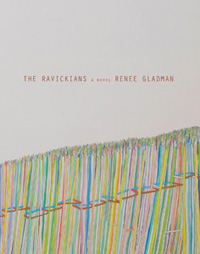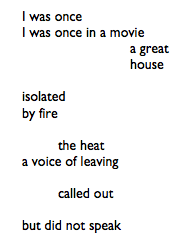 The Ravickians
The Ravickians
by Renee Gladman
Dorothy Project, 2011
168 pages / $16 Buy from Dorothy Project or SPD
The second volume of a trilogy of novels exploring the crumbling, war-torn imaginary country of Ravicka, The Ravickians is less an exploration of the people and culture of Ravicka than it is a breathtaking book-length meditation on loss. The book moves through what it means to be lost, to get lost, to lose connection with your fellow humans and surroundings. This is all done in a brief novel divided into three parts: 1) a first person account of a day spent wandering by The Great Ravickian Novelist Luswege Amini; 2) a poetry reading that same day given by Amini friend Zäoter Limici; and 3) 52 pages in twelve sections of unascribed dialogue spoken during a night out in the broken down capitol city of Ravicka that includes Amini, Limici, other writer colleagues and some new characters not mentioned earlier in the text.
This may sound somewhat disjointed or tough, especially the dialogue, and even given Gladman’s clear plain prose some of the dialogue is impossible to follow, but all of it is tied together through Gladman’s constant complex return to absence and loss. And it’s not just different kinds of loss or absence experienced by Amini in the novel’s longest segment but loss as intimate as a loss of words that shutters a conversation between strangers or as widescreen as the violent destruction of architecture. Architecture is a more readily apparent ongoing concern than loss in the book–characters are obsessed with the architecture of Ravicka, write about it, and define themselves against it–but the surface play of dwelling on the decaying infrastructure of Ravicka is less important than loss when it comes to an idea and an act revisited again and again in the text as story and as performance. I’ll get to “performance” in a second but first, as story, loss dominates both the day narrated by Amini and the writing in the poems presented in the novel’s second part. One example of a two-fold loss happens when Amini visits a local bookstore she likes only to discover that, in the alphabetized bookstore, all of section A is missing, allegedly sold to a collector. Since Amini’s books fall under A this is a loss for both her and the bookstore, one she wonders at:
When there is so little left you do not give it all to one; you fight to keep that thing in the mainstream. What could be worth that kind of sacrifice, literally ridding your house of its first step? My upbringing prevented me from asking [the bookseller] though Hans read the accusation on my face. “It will come back,” he stammered.
Nothing comes back as itself.
Loss gets encountered by Amini throughout the first section, and maybe the most compelling section is when she loses herself, purposely, boarding a train with no destination in mind and riding it until the last stop, then wandering into a large field of tall grass, lying down, and losing herself to sleep. And it isn’t so much that Gladman is trying to present a thesis about loss as absence is refracted through the prism of the three-part book. Another important loss is the loosening of a decades-long relationship between Amini and Ana Patova, a relationship now mostly conducted by a courier who brings Amini messages in languages she cannot decipher. There are more examples, but you get the idea; the pleasure of reading this book isn’t in its characters or story but in how Gladman keeps returning to loss in dozens of interlocking ways.
As for performance: the second and third parts of the book are performances by Gladman and her characters that give a voice to the loss Amini encounters during her wandering. In the second section, poet Limici reads muted, oblique elegies to the loss of buildings and monuments:

Here Gladman’s meditation on loss is echoed by Limici’s writings, a voice through which Gladman can re-write a fictive/poetic text in another voice. What Amini experiences in the first section gets rendered into poetry and delivered, performed on the page.
It’s the final section of the book, though, that’s at once both the most frustrating and the most audacious, compelling, and by the end of the book terrifying. At first, because the dialogue is completely unascribed it becomes clear who’s lost: you, the reader. This works great as a concept but doesn’t initially seem like enough to justify over 50 pages of stuff like this:
-No, Ana Patova, I have not been sleeping
-The sun cheese speaks to him
-All this night I have had intense horizontal energy
-And this table is on the verge of dissolve
-And we are
-And this is
At first this may seem daunting but eventually the partial or minor losses of the character’s lives re-enter the book in a massive, chilling way that they can barely comprehend, much less articulate, and are helpless to do anything about but bear witness. This is all Amini and Limici can ultimately do, and it’s also all you can do as the book progresses more by accumulation than by narrative arc. The novel and the various things that happen in it are so expertly laid out by Gladman and so compelling moment by moment that even if you might have to have patience to fit the different fragments of loss and language together, it’s a novel whose theme and variations are worth bearing witness to.
Tags: nicholas grider, renee gladman, The Ravickians

:(
:/
Great review of a challenging novel. I read it and haven’t found the departure point for my review. The first volume in the series – EVENT FACTORY – grabbed me more. I think the final section/act of THE RAVICKIANS brought the excitement the previous sections boiled down to a flatness. But I’m still searching. Here’s my review of the first book: http://theopenend.com/2010/11/12/renee-gladmans-event-factory-review/
Thanks! I liked your review as well. Gladman’s writing can be very “flat” not so much that it’s plain or boring but that it’s hard to get traction. Partway through this I had doubts but after the scene in the tall grass and the terror of the closing pages I wanted to go read Event Factory as well as the third part of the trilogy when it’s finished.
And it’s worth noting how Gladman’s project is one big complex project; at the library I found a Gladman book that has nothing to do with the trilogy but on the first page there’s a quote from the Great Novelist narrator of this book; there’s an interconnection going on that I’m intrigued about getting into more deeply. (And that book, To That After That (Toaf) was about making a book from the ruins of another book, from what I could gather.)